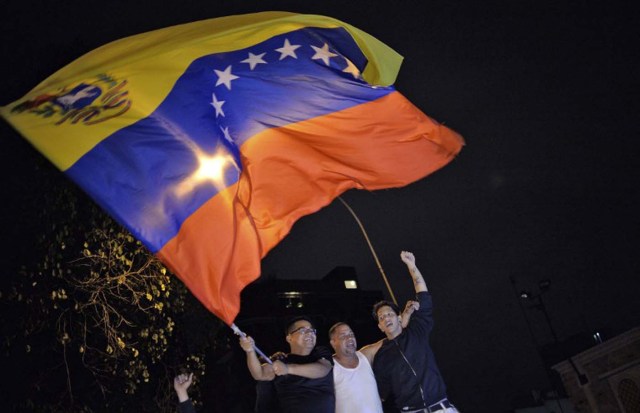
El periódico The Wall Street Journal publicó hoy un editorial en el que asegura que Venezuela tiene una nueva oportunidad para “resucitar” después de la victoria de la oposición en las elecciones legislativas del pasado domingo.
“No todos los días un estado policial sufre un varapalo en las urnas que le obliga a admitir su derrota. Así que un reconocimiento a la oposición venezolana por haber barrido al Partido Socialista Unido de Venezuela (PSUV)”, afirma el periódico en su editorial.
Bajo el título “Esperanza al fin en Venezuela“, el diario asegura que después de 16 años de “gobiernos represores de izquierda”, la victoria opositora del pasado domingo es una “fuente de esperanza” para Venezuela y para el resto del hemisferio occidental.
Asimismo, destaca que un “impresionante” 75 % de los electores fueron a votar, arrastrados por un “desplome” del nivel de vida por la hiperinflación, la escasez de alimentos y una tasa de homicidios “galopante” que ha hecho del país un lugar “miserable” para vivir.
The Wall Street Journal recuerda que “al menos por ahora” el presidente, Nicolás Maduro, ha aceptado su derrota pero cree “poco probable” que lo haya hecho sin la presión de los militares, “que parecen estar cansados del acelerado deterioro que vive el país”.
“La oposición tiene ahora la posibilidad de mejorar la economía y de restaurar el pluralismo político y su primera tarea debe ser ordenar la liberación de los presos políticos, incluido el líder opositor Leopoldo López”, añade el periódico.
Asimismo, insta al nuevo Congreso a levantar “de forma inmediata” los controles de precios para que los empresarios puedan tener un incentivo para producir e importar, y a acabar con los controles de capital y los múltiples sistemas de cambio del Banco Central.
“A este paso, Venezuela se quedará sin reservas internacionales y se enfrentará a una suspensión de pagos en 2017. Reestructurar ahora la deuda con sus acreedores haría menos dolorosa esa perspectiva”, advierte el periódico en su editorial.
The Wall Street Journal recuerda también que los países caribeños han votado junto al “gobierno militar en Caracas” en la Organización de Estados Americanos (OEA) mientras han podido recibir petróleo barato de Venezuela.
“(Hugo) Chávez y Maduro han intercambiado petróleo por ayuda del aparato de inteligencia cubano y poner fin a ello permitirá retener más recursos en Venezuela y enviará una señal de que los días de la represión gubernamental están contados”, concluye.
Editorial
Hope at Last in Venezuela
It isn’t every day that a police state takes such a beating at the polls that it has to admit defeat in its own rigged election. So kudos to the Venezuelan opposition, which thrashed the government’s United Socialist Party of Venezuela (PSUV) in Sunday’s national assembly election, even taking the two-thirds supermajority needed to pass major economic and judicial reforms.
After 16 years of repressive left-wing rule, this is cause for hope in Venezuela and across the Americas. An impressive 75% of the electorate turned out to vote, driven by plummeting living standards. Hyperinflation, food shortages, crumbling public works and soaring murder rates have made the country miserable.
President Nicolás Maduro, the late Hugo Chávez’s handpicked successor, accepted the vote—at least for now. It’s doubtful he would have done so without pressure from the military, which also seems to be fed up with the country’s accelerating decline.
The opposition will now have a chance to improve the economy and restore political pluralism. The first task should be ordering the release of Mr. Maduro’s political prisoners, including opposition leader Leopoldo López.
To end food shortages, the new congress can immediately lift price controls so entrepreneurs have an incentive to produce or import. The only way to strengthen the “strong bolivar,” as the late Hugo Chávez named the currency, is to make it valuable enough for people to hold. That means lifting capital controls and ending the central bank’s multiple exchange-rate system so business can get access to dollars. On current course Venezuela will run out of international reserves and face default in 2017. Restructuring debt now with creditors would make that prospect less painful.
Which brings us to oil. Chávez used the country’s energy wealth to buy permission in Latin America—and Massachusetts; remember Joseph Kennedy’s Citgo PR campaign—for his many human-rights violations. As long as governments in the Caribbean were getting low-priced petroleum from Venezuela, they voted with the military government in Caracas at the Organization of American States.
Chávez and Mr. Maduro have also traded oil for security help from Cuba’s intelligence apparatus. Putting an end to these trades would retain more resources inside Venezuela and send a signal that the days of government repression are numbered. Meanwhile, rejoice that one of this hemisphere’s lost countries has a chance at revival.